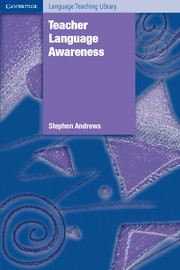Book contents
- Frontmatter
- Contents
- Acknowledgements
- Introduction
- Prologue: The challenge of being ‘language-aware’
- 1 Language Awareness, ‘Knowledge About Language’ and TLA
- 2 TLA and the teaching of language
- 3 TLA and the ‘grammar debate’
- 4 TLA and teachers' subject-matter cognitions
- 5 TLA and pedagogical practice
- 6 The TLA of expert and novice teachers
- 7 TLA and the native-speaker and non-native-speaker debate
- 8 TLA and student learning
- 9 TLA and teacher learning
- Epilogue: TLA and teacher professionalism
- Appendix
- References
- Index
- Publisher's acknowledgements
3 - TLA and the ‘grammar debate’
Published online by Cambridge University Press: 30 July 2009
- Frontmatter
- Contents
- Acknowledgements
- Introduction
- Prologue: The challenge of being ‘language-aware’
- 1 Language Awareness, ‘Knowledge About Language’ and TLA
- 2 TLA and the teaching of language
- 3 TLA and the ‘grammar debate’
- 4 TLA and teachers' subject-matter cognitions
- 5 TLA and pedagogical practice
- 6 The TLA of expert and novice teachers
- 7 TLA and the native-speaker and non-native-speaker debate
- 8 TLA and student learning
- 9 TLA and teacher learning
- Epilogue: TLA and teacher professionalism
- Appendix
- References
- Index
- Publisher's acknowledgements
Summary
Introduction
Chapter 1 spoke of the growing interest in Language Awareness since the 1980s and of the various attempts to develop ways of improving the language awareness of both learners and teachers. This interest and the educational initiatives associated with it are based upon a belief in the value of explicit knowledge about the formal aspects of the language: the language systems. Not surprisingly, therefore, a book with the title Teacher Language Awareness is already taking a position on one of the major issues in L2 education over the years: the explicit/implicit knowledge dichotomy (see 1.4). However, it should not be assumed that the case for learners' needing explicit knowledge of language is open and shut: that issue and the role of form-focused teaching (see 2.4) have been keenly debated subjects over the years.
Whatever the individual teacher's cognitions about such issues, the earlier discussion suggested that they are among the professional factors that affect that teacher's language awareness in pedagogical practice, i.e. the procedural dimension of TLA. In addition, the views on these issues prevailing in the time and place in which the L2 teacher is working exert a profound influence on contextual factors such as the syllabus and teaching materials, which also affect the operation of that teacher's language awareness in the language classroom (as illustrated in Chapter 2, Figure 3). The role of form-focused instruction is not, however, the only aspect of the ‘grammar debate’ of relevance to the L2 teacher.
- Type
- Chapter
- Information
- Teacher Language Awareness , pp. 48 - 69Publisher: Cambridge University PressPrint publication year: 2007



